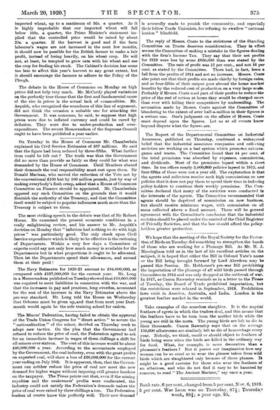The Miners' Federation, having failed to obtain the approval of
the Trade Union Congress for " direct action " to secure the " nationalization " of the mines, decided on Thursday week to adopt new tactics. On the plea that the Government had refused to reduce the price of coal, the Federation agreed to ask for an immediate increase in wages of three shillings a shift for all miners over sixteen. The cost of this increase would be about £40,000,000 a year. According to the accountants employed by the Government, the coal industry, even with the great profits on exported coal, will show a loss of £26,000,000 for the current year ending on July 16th. It is apparent, then, that the Govern- ment can neither reduce the price of coal nor meet the new demand for higher wages without imposing still greater burdens on the taxpayer. The Times points out that, even if the mining royalties and the coalowners' profits were confiscated, the industry could not satisfy the Federation's demands unless the price of coal were raised by three shillings a ton. The Federation leaders of course know this perfectly well. Their new demand
is avowedly made to punish the community, and especially their fellow Trade Unionists, for refusing to swallow " national- ization " blindfold.




































 Previous page
Previous page